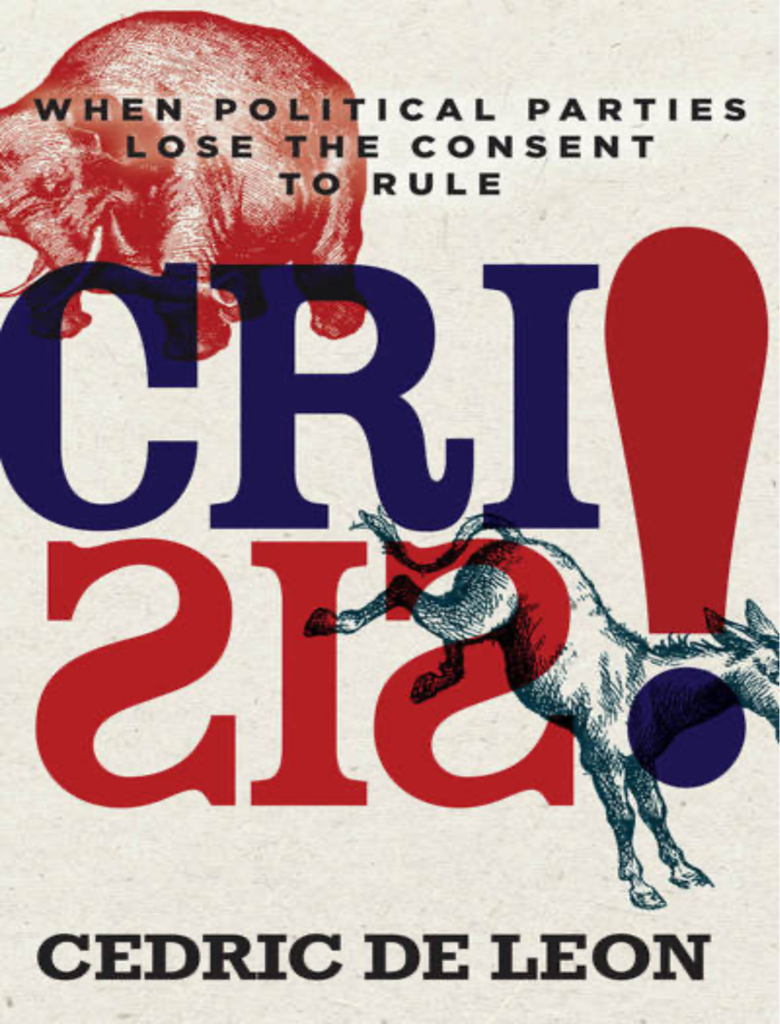The Evil that is Political Parties
David McLellanCedric de Leon, Crisis! When Political Parties Lose the Consent to Rule (Stanford, CA: Stanford University Press, 2019, pp. 232 )
The COVID-19 pandemic played its part in upending our politics. Nonetheless, it gave us the opportunity, at least, to reconsider the ways in which we might live together in tough times. Crisis! When Political Parties Lose the Consent to Rule gives us a challenging historical perspective through which to view the possibilities available to us. For a deeper approach, we could turn to Simone Weil and particularly her 1943 essay proposing the abolition of political parties. What links the two is a profound and justified antipathy to the political party system.

Cedric de Leon’s antipathy is more muted and more implicit than that of Weil. Almost half of his book is devoted to a discussion of the reasons for the outbreak of the American Civil War. Leon, the Labor Center Director Professor at the University of Massachusetts at Amherst, asks why the war broke out in 1861 rather than twenty years earlier when the socio-economic circumstances had been much the same. The reason, he claims, lies in the actions of political parties. He writes: “Rather than look to voters’ interests and policy preferences for the sources of crisis, I look to parties and politicians. . . . Like the triumph of ethnic nationalism today, secession was partly the result of broken promises and partisan maneuvers, the outcome of which many people underestimated.” Much the same holds true of Professor Leon’s examination of the present crisis shattering the United States’ Democratic and Republican parties in ways that led to the 2016 election of Donald Trump and his unsettling, but continued, post-election chokehold on the Republican party.
A complex and systemic problem
By Leon’s measure, the result of all this today is either a form of Caesarian authoritarianism or an attempt by political parties to continue their ascendancy by a reformed neo-liberalism. Neither, in his view, will work in the long term. The only solution, therefore, is what he calls “economic democracy” in which “none of us can be free unless all of us have power in the workplace and are key stakeholders in the economy.” Politicians and parties cannot lead us into the promised land. Only a broad collation of all oppressed groups, he argues, can give life to the old adage: we are the ones we have been waiting for.

Leon’s thesis is buttressed by impressive historical analysis and empirical investigation. But it also prompts wider consideration. Parties and politicians are only part of a more complex and systemic problem. The party system is resilient in that it is flexible and self-adjusting. Attack it in one place and it re-adjusts itself to absorb the attack. Leon is on point when it comes to what he calls this “re-absorption”: while appearing to give in to the attack, the system finds another way to carrying on with its same old mission. And this is often achieved by adopting, for its own, those weapons used against it: it co-opts the language of rights, of freedom, of justice, twisting every word to its own purpose. Politicians and political parties make promises, which in the end serve mainly themselves.
A broader perspective
It is in this context, albeit seen from a more wide-ranging perspective, that we would do well to consider Simone Weil’s reflections on the role of political parties. The problem is even greater than Leon portrays it to be. Such problems are more radical, and on reflection, even more shocking. Weil says, for example, “the institution of political parties appears to be an almost unmixed evil. They are bad in principle, and in practice their impact is noxious. The abolition of parties would prove almost wholly beneficial. It would be a highly legitimate initiative in principle, and in practice could only have a good effect” (OAAPP, 28).
Whatever one makes of Weil’s proposed remedy, her critique of the maladies caused by political parties is difficult to disregard. Given its modern context, however, the crisis of our times is far from shocking. Something of the same holds true historically. For example, the political system of the Third Republic (1870-1940) had practically led to the extinction of France, and it was therefore vital to prevent that system’s return. The cancer at the heart of the Third Republic had been the sovereignty of Parliament and its manipulation by political parties. Predictably, opposition to the party system was strong among Weil’s colleagues in Free French London.

Notably, Weil’s proposals had a firm sociological basis. Political parties, she observed, were machines to promote collective passions and therefore exert collective pressure on the thought processes of their members. Yet they were even more: their real aim was limitless growth coupled with unchecked power. Parties were an example – along with money, power, national glory, and economic production – of the constant error of mistaking ends for means. An indication of this was the absence of any clearly definable doctrine in political parties.
Consistent with Leon’s thesis but moving well beyond it, Weil argued that as difficult as it was for an individual to articulate a doctrine, the collectivity could never produce one. Why? Because it embodied, despite all its hollowness, the supreme Doctrine; it was its own end. This amounted to idolatry since God alone was end and not means. And, since a political party could never have enough power, it led straight to totalitarianism.
This absence of any distinctly articulable objective, and its replacement with propaganda, resulted in a dangerous disregard for justice and truth. Was there not abundant evidence of this, for example, in the 2020 United States presidential election when the “stop the steal” mantra became the rallying cry of some 74 million blindly loyal Trump Republicans? Given that, it is unimaginable that any Republican politician, then or now, would declare that
. . . whenever I examine any political or social problems, I promise to forget completely the fact that I am a member of [the Republican party] and to concern myself exclusively with seeking out the public good and justice.
— Simone Weil, Ecrits de Londres, p.136
To utter such words would end the influence any person might have in his or her political party. By Weil’s gauge, one was obliged to think and speak of only that which was true rather than what was politically desirable. In that case, “you think such a thing not because you are, as it happens, [a Republican or Democrat, or belong to the Conservative or Labour Party] but because the irresistible light of evidence obliges you to think this and nothing else” (Weil, Ecrits de Londres, 137). Political parties feared, Weil added, any genuine “personal point of view.” By stark contrast, today justice and truth are regarded as merely matters of ideological preference, albeit shaped by political parties.
Curing an incurable disease

Weil’s thoughts – which were rooted in Rousseau’s Social Contract – follow from her stressing the value of reason over passion. Reason, she said, is the same in all human beings, whereas the passions more often than not are different. She would have sympathized with Yeats on “The Second Coming”:
Things fall apart; the centre cannot hold;
The best lack all conviction, while the worst
Are full of passionate intensity.
This tendency to take ideological sides with passionate intensity has spread like a disease from politics to science and beyond. Worse still, it has relieved people of the obligation to think. That being so, the disease is fatal. Hence Weil’s logic: the disease is unlikely to be cured without the abolition of political parties.
It is important to remember that Weil’s thoughts on the role and future of political parties were part of proposals for a constitution of the imminent Fourth Republic. And her views were given renewed force by what De Gaulle cursed as “le malheur des parties.” But Weil and her Free French colleagues in London could, given the complete collapse of the French political system, start from scratch – they had before them a tabula rasa.
The unending crisis
These sequences are not just “one damn thing after another”:
Cedric de Leon
they share a logic and represent a crisis sequence . . . .
Those words suggest a problem far graver than anything that can be remedied by calls for conventional reform. For one thing, the pandemic has greatly reconfigured the political landscape along party lines; the Brexit debate in the United Kingdom has produced strong partisan identities more widely shared than fading attachments to traditional political parties, and the storming of the Capitol in the United States could be seen as a similar rejection of traditional party politics in favor of a man who remade the Republican party in his idolatrous image. At this point in time, there is ample reason to believe that that there will indeed be a “sequence” to the evils now generated by mindless party allegiance. Seen in that light, Weil’s sober realism seems ever more on the mark.
Old habits die hard, and we do not have Simone Weil’s advantage of a tabula rasa. But we would do well to remember her injunction: to be always relevant you have to say something that is eternal.
David McLellan is currently a visiting Professor of Political Theory at Goldsmiths’ College, University of London. He was previously Professor of Political Theory at the Department of Politics and International Relations at the University of Kent. His books include Simone Weil: Utopian Pessimist (1989) and Marxism after Marx (1980).
2 Recommendations
